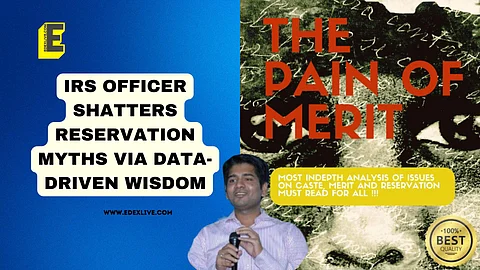

Nethrapal is an individual donning several hats – an Indian Revenue Service (IRS) officer, a distinguished alumnus of the Indian Institute of Technology (IIT) Madras and the Indian Institute of Management (IIM) Bangalore, and now, a fervent advocate against the negative stereotypes surrounding India's reservation system. His weapon of choice? Data. He endeavours to counter the sprawling landscape of misinformation, leading people toward a more nuanced understanding of how India's reservation systems operate.
EdexLive embarked on a telephonic interview with him to learn more about him, the motivation behind his work and his book, The Pain of Merit.
Battling misinformation
His book, The Pain of Merit, is a result of Nethrapal's tireless pursuit through the corridors of reservation data, where he consolidated scattered information from academic papers, scientific journals, annual reports, and even the tweets of eminent scholars. On October 14, he published the book's third chapter for free via X (formerly Twitter), emphasising, “There are no commercial attributes…I hope this will act as a knowledge base for countering lakhs of anti-reservation tweets aimed at spreading hatred against the disadvantaged.” The tweet has already garnered 32.4K views and numerous retweets.
Nethrapal's voice resonates with sincerity as he explains his mission: "Most data on caste-based reservation in India is scattered and lacks a unified source. My intention is to consolidate all this data, shedding light on the stark realities and empowering people with knowledge." His endeavour, he emphasises, is, "My way of giving back to society."
In India, the ongoing debate surrounding caste-based reservations is a complex interplay between the principles of merit and efficiency, and the historical legacy of discrimination across generations. The reservation system was introduced as a means to rectify historical injustices and provide marginalised communities with equal opportunities. However, as the country continues to grapple with this issue, people still question the effectiveness of the system, its fairness, and long-term implications, which mostly Dalit-right activists and scholars argue are out of ignorance and misinformation.
Officer Nethrapal’s research provides in-depth details of how most of these perceptions are false and have nothing to do with the actual reality of the situation. “I see how all over social media, people ask questions like, 'What will happen if we get treated by reserved doctors?' — they find every means to put reserved candidates down,” he laments. In a world where critics decry reserved candidates as unfit, Nethrapal points out, "But if you see the cut-off is not that different, especially in bureaucracy."
Here come the educational institutes
The issue doesn't stop at government services; it extends to many educational institutions where, according to Nethrapal, students from reserved categories are unfairly presumed to have lower intelligence or academic aptitude. "This perception fosters discrimination, which is unjustified. In the long run, it negatively impacts students from reserved categories and can lead to their isolation," he observes.
Instances of such discrimination are prevalent in institutions like IITs and IIMs, where tragic cases of Dalit students taking their own lives have become commonplace. Most marginalised students report feeling alienated and bereft of peers with whom they can connect. The environment aggravates their woes, with the institution's community often regarding them as second-class citizens unworthy of a place in their own academic homes.
Officer Nethrapal stresses the nature of the merit versus efficiency debate and underscores the historical subjugation that still haunts the nation. He questions, "How will they ever compete with the more fortunates?" It is a reminder that special rights are a lifeline for those who have historically been pushed to the margins.
"Dalits have historically been disadvantaged, rendering them vulnerable. That's precisely why they need these special rights to level the playing field. Without them, how could they ever hope to access esteemed institutions like IIMs and IITs, let alone compete with the more fortunate?" he says.
Moreover, Nethrapal points out that the mandated reservation of 50% has never been fully realised. “We have only achieved 35% reservation so far and as one ascends the hierarchy, and as you ascend the hierarchy, representation dwindles to a mere whisper,” he shares.
His work shines a light on these intricacies. "I think this happened due to a lack of network or because of the perception about reserved candidates," Nethrapal noted, adding that other factors, such as age, play a role since many reserved candidates enter their jobs at a later stage.
According to Nethrapal, the disregard for reservation rules in educational institutions is a pervasive issue, with IITs and IIMs being among the most afflicted. “Now, the issue has become political as well,” he points out. Additionally, he distinguishes between older and newer IITs, asserting that the reservation issue is more acute in the former. When it comes to IIMs, the situation is even more dire, with what officer Nethrapal describes as "zero representation."
In most central universities, officer Nethrapal says, the situation is this dire, but comparatively, state and deemed universities are doing much better when it comes to representation. Drawing a sharp contrast with Western universities like Harvard, he underscores the vast diversity they embrace. "At least 20% of the faculty there you will find are from marginalised communities like the African Americans," he says. "So with this book, I aim to challenge the created and misdirected perceptions about representation that exist in India: That the issue is reservation. It never is. We are not eating your pie."
In a world where diversity is celebrated, the question looms large: Can India, with its intricate reservation dynamics, ever aspire to achieve similar inclusivity? Nethrapal's journey and his book provide a captivating exploration of these questions, all underscored by his profound sense of duty towards society, or as he puts it, "Paying back to society." It's the narrative of a man who chuckles through the phone but shoulders the weight of social change, one data point at a time.
